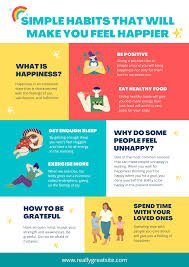In 2025, more people are realizing that small, sustainable changes to their lifestyle can lead to significant improvements in their overall health and happiness. Making positive adjustments doesn’t require drastic measures; simple daily habits can lead to a more balanced, joyful, and healthier life. This guide provides actionable steps you can take right now to boost your physical, mental, and emotional well-being with minimal effort.
1. Adopt a Balanced Diet for Better Health
One of the most impactful lifestyle changes you can make is to improve your diet. A well-balanced diet fuels your body with essential nutrients, helping to prevent chronic illnesses and maintain optimal health.
Key Tips:
-
Eat More Whole Foods: Focus on whole, minimally processed foods like fruits, vegetables, lean proteins, and whole grains. These provide more nutrients and less added sugar or unhealthy fats.
-
Portion Control: Pay attention to portion sizes to avoid overeating. Eating mindfully can help you understand when you’re full and prevent unnecessary calorie intake.
-
Limit Sugar and Processed Foods: Reduce your intake of sugary snacks, sodas, and fast food. These can lead to weight gain, energy crashes, and long-term health issues like diabetes.
Why It’s Important:
-
Improved Energy: A healthy diet provides consistent energy, reduces fatigue, and supports overall bodily functions.
-
Prevention of Health Issues: A balanced diet helps maintain a healthy weight, supports heart health, and reduces the risk of chronic diseases.
2. Prioritize Physical Activity for Physical Fitness
Regular exercise is essential for both physical and mental well-being. Even small amounts of movement each day can provide significant benefits, such as increased energy, better mood, and improved cardiovascular health.
Key Tips:
-
Start with Simple Workouts: Incorporate walking, stretching, or light yoga into your daily routine. These activities can be done at home or outdoors and require no special equipment.
-
Find an Activity You Enjoy: Choose a form of exercise that you find enjoyable, whether it’s dancing, swimming, cycling, or running. This will make it easier to stick to your routine.
-
Aim for Consistency: Aim for at least 30 minutes of moderate exercise most days of the week. Consistency is key to seeing long-term benefits.
Why It’s Important:
-
Physical Health: Regular exercise boosts your metabolism, strengthens muscles, improves cardiovascular health, and helps maintain a healthy weight.
-
Mental Clarity: Exercise releases endorphins, the body’s natural mood boosters, leading to reduced stress and improved mental clarity.
3. Get Sufficient Sleep for Optimal Rest and Recovery
In 2025, it’s clear that sleep plays a vital role in maintaining overall health. Sleep is essential for recovery, cognitive function, and emotional well-being. Unfortunately, many people don’t get the recommended 7-9 hours of sleep each night.
Key Tips:
-
Establish a Sleep Routine: Go to bed and wake up at the same time each day to regulate your body’s internal clock. Consistency helps improve sleep quality.
-
Create a Relaxing Bedtime Routine: Reduce exposure to screens and avoid caffeine or heavy meals before bed. Instead, try reading a book or practicing deep breathing exercises.
-
Make Your Sleep Environment Comfortable: Ensure your bedroom is cool, dark, and quiet. Invest in a comfortable mattress and pillows that support restful sleep.
Why It’s Important:
-
Physical Restoration: Sleep is crucial for the body’s repair processes, muscle recovery, and immune function.
-
Mental and Emotional Health: Adequate sleep helps regulate mood, reduce stress, and improve cognitive function, ensuring you are better equipped to handle daily challenges.
4. Practice Mindfulness and Meditation for Mental Clarity
Incorporating mindfulness and meditation into your daily routine can significantly improve your mental health. These practices help reduce stress, increase emotional resilience, and promote a sense of calm and focus.
Key Tips:
-
Start Small: Begin with just 5-10 minutes of mindfulness or meditation each day. Use apps like Headspace or Calm to guide you through relaxation techniques.
-
Focus on Breathing: Deep breathing exercises can quickly reduce stress and anxiety, making it easier to stay calm and focused.
-
Incorporate Mindful Moments: Practice mindfulness throughout the day by paying attention to the present moment, whether you’re eating, walking, or working.
Why It’s Important:
-
Stress Reduction: Regular mindfulness practice helps lower cortisol levels, reducing feelings of stress and anxiety.
-
Improved Focus: Meditation sharpens concentration and promotes mental clarity, making it easier to complete tasks efficiently and with greater focus.
5. Stay Hydrated for Better Health and Energy
Hydration is often overlooked but is one of the easiest ways to improve your overall health and well-being. Drinking enough water supports digestion, boosts energy levels, and helps maintain healthy skin and joints.
Key Tips:
-
Drink Water Throughout the Day: Aim for at least 8 cups (64 oz) of water per day. Adjust based on activity level and climate, as you may need more if you’re exercising or in a hot environment.
-
Add Flavor Naturally: If plain water feels boring, try adding slices of lemon, cucumber, or mint to enhance flavor without extra calories.
-
Monitor Your Intake: Carry a reusable water bottle to remind yourself to drink regularly. Setting reminders on your phone can help you stay on track.
Why It’s Important:
-
Supports Bodily Functions: Water is crucial for maintaining healthy body systems, including digestion, metabolism, and circulation.
-
Boosts Energy: Staying hydrated helps combat fatigue, improving concentration and physical performance.
6. Foster Meaningful Relationships for Emotional Well-Being
Strong, positive relationships are fundamental to leading a happy and fulfilling life. In 2025, it’s more important than ever to nurture connections with loved ones, friends, and colleagues.
Key Tips:
-
Prioritize Quality Over Quantity: Focus on building deep, meaningful relationships rather than trying to maintain many superficial connections.
-
Engage in Regular Communication: Make time to check in with family and friends, whether through calls, video chats, or face-to-face interactions.
-
Practice Active Listening: When engaging with others, listen attentively and offer support, showing that you care and value the relationship.
Why It’s Important:
-
Emotional Health: Meaningful relationships offer emotional support, reduce feelings of loneliness, and provide a sense of community.
-
Happiness and Fulfillment: Strong social bonds are closely linked to higher levels of happiness and overall life satisfaction.
7. Declutter and Organize Your Space for Mental Clarity
A tidy, organized environment can have a significant impact on your mental clarity and stress levels. In 2025, more people are embracing minimalism and organization as a means of achieving peace and focus.
Key Tips:
-
Declutter Regularly: Set aside time each week to tidy up your living and work spaces. Get rid of items that no longer serve a purpose.
-
Create Functional Spaces: Organize your home and workspace to promote productivity and comfort. Use storage solutions to keep things neat and accessible.
-
Simplify Your Surroundings: Adopt minimalist principles by reducing unnecessary items and focusing on what truly adds value to your life.
Why It’s Important:
-
Reduces Stress: An organized environment leads to fewer distractions and a sense of calm, which can reduce mental clutter.
-
Boosts Productivity: A clean and well-organized space helps you focus on what’s important, making it easier to complete tasks and feel accomplished.
8. Limit Screen Time for Better Mental Health
While technology can be helpful, excessive screen time can negatively impact mental health, sleep, and productivity. In 2025, limiting screen time is essential for maintaining a healthy balance in life.
Key Tips:
-
Set Screen Time Limits: Use features like Digital Wellbeing on Android or Screen Time on iOS to track and limit your screen usage.
-
Take Regular Breaks: Follow the 20-20-20 rule: every 20 minutes, take a 20-second break and look at something 20 feet away to reduce eye strain.
-
Disconnect Before Bed: Avoid screens at least an hour before bedtime to improve sleep quality and reduce the impact of blue light on your circadian rhythm.
Why It’s Important:
-
Improves Sleep Quality: Reducing screen time before bed helps prevent disruptions to your sleep cycle, leading to better rest.
-
Mental Clarity: Less screen time promotes better mental health by reducing stress and the negative effects of social media.
Conclusion: Embrace Small Changes for a Healthier, Happier Life
In 2025, improving your health and happiness doesn’t require drastic transformations. Simple lifestyle changes—like adopting a balanced diet, practicing mindfulness, staying hydrated, and fostering relationships—can have a profound impact on your overall well-being. By implementing these small but effective changes into your daily routine, you can lead a more fulfilling, joyful, and healthier life. Start today by incorporating these habits, and enjoy the benefits of a balanced lifestyle that promotes both physical and emotional well-being.


